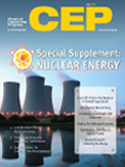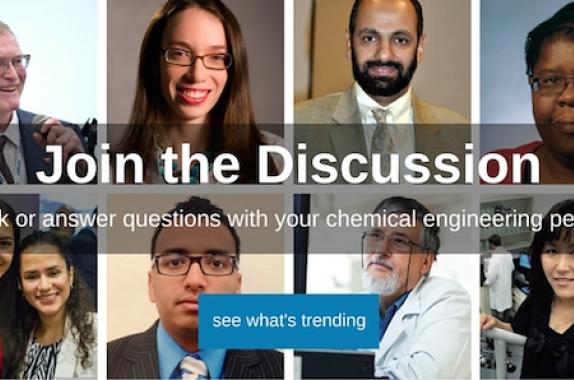 Special Supplement: Nuclear Energy
Special Supplement: Nuclear Energy
Prepared in collaboration with AIChE's Energy Advisory Board as part of the Institute's Energy Initiative, this year's energy supplement focuses on nuclear energy.
o
Face-Off: (click
here to read this article now)
Nuclear Energy: A Vital Component of Our Energy Future
Nuclear power is proven to be safe, and it is our best shot at increasing energy production while reducing CO2 emissions levels.
o
Nuclear Renaissance: A Flawed Proposition
Nuclear power has never been safe and it never will be. Efficiency gains and investment in renewable sources of energy will be sufficient to power the planet without resorting to nuclear reactors.
o
Nuclear Waste Policy in the United States
The current U.S. reactor fleet produces 2,100-2,400 ton/yr of spent nuclear fuel (SNF). After 50-plus years of nuclear power generation, 64,000 tons of SNF has accumulated in temporary storage at the reactor sites. How did we get where we are, and where do we go from here?
o
Nuclear Power: Energy to Produce Liquid Fuels and Chemicals
Using nuclear energy to operate refineries and chemical plants would allow more fossil and biomass resources to be converted to fuel and chemical products.
o
Nuclear Power: Fueling the Hydrogen Economy
Nuclear hydrogen might first enter the transportation market to supplement existing fossil resources. In the long-term, it could be a key in the development of a hydrogen economy.
o
Developing a Position on Nuclear Power
AIChE's Nuclear Engineering Division recommends expanding the role of nuclear power and closing the nuclear fuel cycle. What are your views?
o
Energy Research: Following the Money
Surveys of the energy-related papers presented at AIChE's annual meetings shed light on the funding pathways for energy research by chemical engineers.
Reactions and Separations: Use Oxygen to Improve Combustion and Oxidation
Substituting oxygen for air is often a low-cost, easy-to-implement option that can reduce capital costs, lower emissions, and improve process flexibility and reliability.
Back to Basics: Choosing Specialty Metals for Corrosion-Sensitive Equipment
Specialty metals should be considered for processes that push beyond the corrosion limits of steel. New composites and surface alloy technologies expand the options for defending against corrosion.
News Feature: Radical Designs Boost Resource Efficiency
The top projects in the recent 10xE Design Challenge showcase the best examples of resource-efficient, integrative design from the chemical engineering community.
News: Using Cells to Diagnose Food Allergies More Accurately ... Carbon Nanotubes Improve Power Capacity in Lithium Batteries ... OTC Launches Arctic Technology Conference, Feb. 7-9, 2011, in Houston ... Smarter Self-Healing Concrete Extends the Life of Structures ... Liquid Method Produces Pure Graphene ... New Yeast Ferments More Sugar to Produce More Ethanol ... Chem Economics: Outlook Improves for Chemical Industry Capital Spending.
Plus: Institute News: Director Candidates' Statements ... Bio Beat: Engineering Personalized Medicine ... Process Safety Beacon: Passive Safety Equipment ... What's New ... Product Digest: Valves ... Software & Information Technology ... We're History: Back to the Future -- Revisiting the Chemical Origins of Life Experiment ... and More.
The July 2010 issue of CEP is now available online. AIChE members receive access to CEP, including a searchable archive of issues dating back to 2001, online at
http://www.aiche.org/cep.
 Special Supplement: Nuclear Energy
Prepared in collaboration with AIChE's Energy Advisory Board as part of the Institute's Energy Initiative, this year's energy supplement focuses on nuclear energy.
o Face-Off: (click here to read this article now)
Nuclear Energy: A Vital Component of Our Energy Future
Nuclear power is proven to be safe, and it is our best shot at increasing energy production while reducing CO2 emissions levels.
o Nuclear Renaissance: A Flawed Proposition
Nuclear power has never been safe and it never will be. Efficiency gains and investment in renewable sources of energy will be sufficient to power the planet without resorting to nuclear reactors.
o Nuclear Waste Policy in the United States
The current U.S. reactor fleet produces 2,100-2,400 ton/yr of spent nuclear fuel (SNF). After 50-plus years of nuclear power generation, 64,000 tons of SNF has accumulated in temporary storage at the reactor sites. How did we get where we are, and where do we go from here?
o Nuclear Power: Energy to Produce Liquid Fuels and Chemicals
Using nuclear energy to operate refineries and chemical plants would allow more fossil and biomass resources to be converted to fuel and chemical products.
o Nuclear Power: Fueling the Hydrogen Economy
Nuclear hydrogen might first enter the transportation market to supplement existing fossil resources. In the long-term, it could be a key in the development of a hydrogen economy.
o Developing a Position on Nuclear Power
AIChE's Nuclear Engineering Division recommends expanding the role of nuclear power and closing the nuclear fuel cycle. What are your views?
o Energy Research: Following the Money
Surveys of the energy-related papers presented at AIChE's annual meetings shed light on the funding pathways for energy research by chemical engineers.
Reactions and Separations: Use Oxygen to Improve Combustion and Oxidation
Substituting oxygen for air is often a low-cost, easy-to-implement option that can reduce capital costs, lower emissions, and improve process flexibility and reliability.
Back to Basics: Choosing Specialty Metals for Corrosion-Sensitive Equipment
Specialty metals should be considered for processes that push beyond the corrosion limits of steel. New composites and surface alloy technologies expand the options for defending against corrosion.
News Feature: Radical Designs Boost Resource Efficiency
The top projects in the recent 10xE Design Challenge showcase the best examples of resource-efficient, integrative design from the chemical engineering community.
News: Using Cells to Diagnose Food Allergies More Accurately ... Carbon Nanotubes Improve Power Capacity in Lithium Batteries ... OTC Launches Arctic Technology Conference, Feb. 7-9, 2011, in Houston ... Smarter Self-Healing Concrete Extends the Life of Structures ... Liquid Method Produces Pure Graphene ... New Yeast Ferments More Sugar to Produce More Ethanol ... Chem Economics: Outlook Improves for Chemical Industry Capital Spending.
Plus: Institute News: Director Candidates' Statements ... Bio Beat: Engineering Personalized Medicine ... Process Safety Beacon: Passive Safety Equipment ... What's New ... Product Digest: Valves ... Software & Information Technology ... We're History: Back to the Future -- Revisiting the Chemical Origins of Life Experiment ... and More.
The July 2010 issue of CEP is now available online. AIChE members receive access to CEP, including a searchable archive of issues dating back to 2001, online at http://www.aiche.org/cep.
Special Supplement: Nuclear Energy
Prepared in collaboration with AIChE's Energy Advisory Board as part of the Institute's Energy Initiative, this year's energy supplement focuses on nuclear energy.
o Face-Off: (click here to read this article now)
Nuclear Energy: A Vital Component of Our Energy Future
Nuclear power is proven to be safe, and it is our best shot at increasing energy production while reducing CO2 emissions levels.
o Nuclear Renaissance: A Flawed Proposition
Nuclear power has never been safe and it never will be. Efficiency gains and investment in renewable sources of energy will be sufficient to power the planet without resorting to nuclear reactors.
o Nuclear Waste Policy in the United States
The current U.S. reactor fleet produces 2,100-2,400 ton/yr of spent nuclear fuel (SNF). After 50-plus years of nuclear power generation, 64,000 tons of SNF has accumulated in temporary storage at the reactor sites. How did we get where we are, and where do we go from here?
o Nuclear Power: Energy to Produce Liquid Fuels and Chemicals
Using nuclear energy to operate refineries and chemical plants would allow more fossil and biomass resources to be converted to fuel and chemical products.
o Nuclear Power: Fueling the Hydrogen Economy
Nuclear hydrogen might first enter the transportation market to supplement existing fossil resources. In the long-term, it could be a key in the development of a hydrogen economy.
o Developing a Position on Nuclear Power
AIChE's Nuclear Engineering Division recommends expanding the role of nuclear power and closing the nuclear fuel cycle. What are your views?
o Energy Research: Following the Money
Surveys of the energy-related papers presented at AIChE's annual meetings shed light on the funding pathways for energy research by chemical engineers.
Reactions and Separations: Use Oxygen to Improve Combustion and Oxidation
Substituting oxygen for air is often a low-cost, easy-to-implement option that can reduce capital costs, lower emissions, and improve process flexibility and reliability.
Back to Basics: Choosing Specialty Metals for Corrosion-Sensitive Equipment
Specialty metals should be considered for processes that push beyond the corrosion limits of steel. New composites and surface alloy technologies expand the options for defending against corrosion.
News Feature: Radical Designs Boost Resource Efficiency
The top projects in the recent 10xE Design Challenge showcase the best examples of resource-efficient, integrative design from the chemical engineering community.
News: Using Cells to Diagnose Food Allergies More Accurately ... Carbon Nanotubes Improve Power Capacity in Lithium Batteries ... OTC Launches Arctic Technology Conference, Feb. 7-9, 2011, in Houston ... Smarter Self-Healing Concrete Extends the Life of Structures ... Liquid Method Produces Pure Graphene ... New Yeast Ferments More Sugar to Produce More Ethanol ... Chem Economics: Outlook Improves for Chemical Industry Capital Spending.
Plus: Institute News: Director Candidates' Statements ... Bio Beat: Engineering Personalized Medicine ... Process Safety Beacon: Passive Safety Equipment ... What's New ... Product Digest: Valves ... Software & Information Technology ... We're History: Back to the Future -- Revisiting the Chemical Origins of Life Experiment ... and More.
The July 2010 issue of CEP is now available online. AIChE members receive access to CEP, including a searchable archive of issues dating back to 2001, online at http://www.aiche.org/cep.







